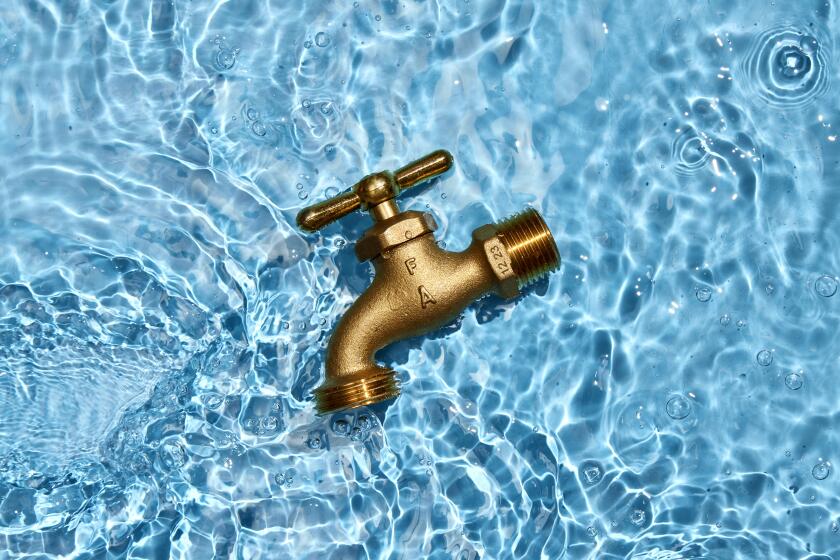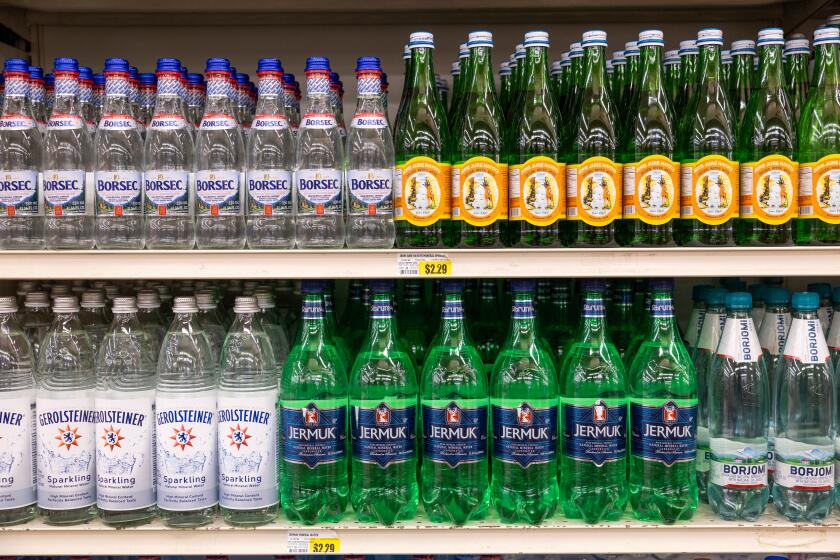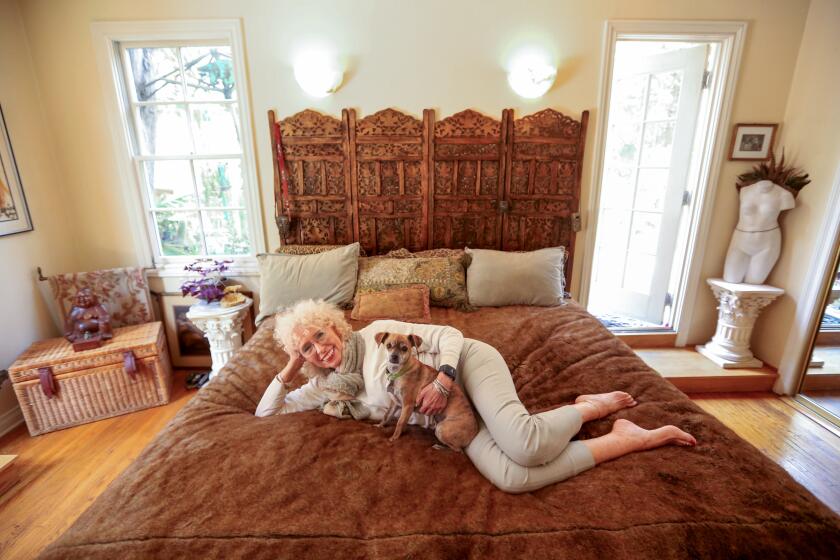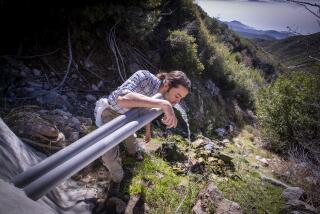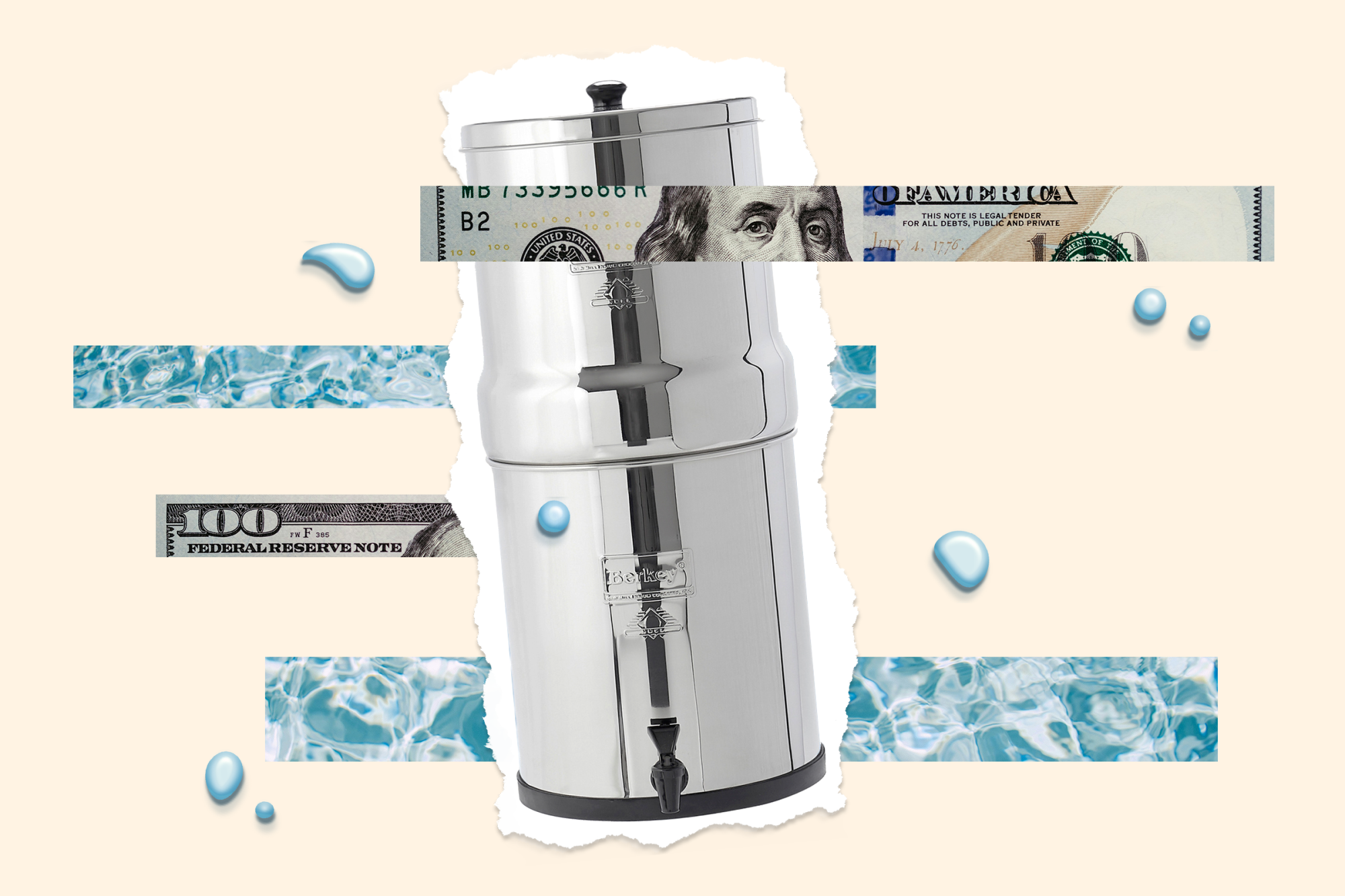
- Share via
Katya Mosely remembers the exact moment it all began, a few years ago. “It was my daughter’s piano teacher,” she says. “She had a 6-inch-long stick of charcoal floating in her glass water bottle. I saw it, and that’s what sent me down the rabbit hole.”
Mosely, the owner of Spirit Gate Acupuncture & Wellness in Mid-City, was already using a Brita to purify her tap water, but she wasn’t sure she trusted the results. So down she went, spiraling deep into the world of charcoal-based filters, where she eventually landed on an odd-looking contraption with a friendly name: the Berkey.
In L.A., water rules everything around us. Drink up, cool off and dive into our stories about hydrating and recreating in the city.
A stainless-steel vessel that claims to remove more impurities than better-known filters, the standard Berkey is nearly 20 inches tall and looks a bit like a cross between a Russian samovar and a decommissioned missile casing. By comparison, a plastic fridge-dwelling Brita appears toy-like — a Huffy trike parked next to a Tesla Cybertruck. The Berkey also can be harder to maintain than other systems, with long-lasting filters that require periodic cleaning. And it’s much, much slower, taking hours to filter a full 2.25-gallon tank.
Which is all to say, it was exactly what Mosely wanted. As a bonus, her Berkey now delivers more than just clean, crisp-tasting water at work.
“People come through my office and see it and give me a little nod of acknowledgment. Like, ‘Oh, she knows what’s up. Look at her Big Berkey,’” she says, laughing.
We spoke to experts in the realms of science, academia and water filtration to help you navigate the often complicated, ever-fluid world of residential tap water, so that you can make smarter and more informed choices about how to purify your drinking water.
The if-you-know-you-know appeal of Berkey turns out to be one of its defining features here in L.A., where its name tends to prompt one of two reactions: Either you’ve never heard of it, or you’re obsessed. Maybe you’ve seen one at your GOOP-iest friend’s apartment or at an alternative healthcare practice where new healing modalities are welcome and plain old tap water is absolutely not. Maybe you even noticed when the trendsetting L.A. apparel brand Online Ceramics released a bootleg Berkey hoodie in December, confirming the filter’s status as a kind of secret handshake for the town’s Palo Santo-burning, quartz-collecting cognoscenti.
“I think it’s popular because Britas are plastic. And plastic is becoming really not chic,” says Sabrina Lemus, a Los Feliz resident who jokingly self-describes as “wellness-pilled” and keeps crystals under her Berkey to charge the water with good vibrations. “Plus, the water just tastes so good.”
I think it’s popular because Britas are plastic. And plastic is becoming really not chic.
— Sabrina Lemus, Los Feliz resident
Amie Ray Bourget, an L.A.-based doula, loves her Berkey so much that she uses it to repurify the water that comes out of her full-home filtration system. (“When it goes through the Berkey, it’s just extra filtered and extra good for you,” she says.) Like many fans I spoke to, Bourget and Lemus are both genuinely passionate about clean living and also quick to crack a self-deprecating joke about the unusual lengths they’ll go to achieve it. Other Berkey owners lightheartedly referred to their own water regimens as “ridiculous,” “insane” and even “psycho.”
Berkey’s stronghold here in L.A. makes sense. The filter taps into a potent mixture of our preoccupations: clean living, water safety, sustainability, disaster preparedness and, crucially, attainable luxury (the average Big Berkey retails at $384). But the full, unfiltered account of Berkey’s rise is a murkier tale, involving fights with the Environmental Protection Agency and the state of California, doomsday preppers and a right-wing media blitz. Berkey’s water may be crystal clear; its story, on the other hand, is anything but.
It all started more than a hundred years ago, when a lethal cholera outbreak was ripping through the German town of Hamburg. Untreated water was to blame, and an unlikely hero emerged: Wilhelm Berkefeld, the inventor of a ceramic device that helped purify the city’s drinking water and reduce the epidemic’s death toll. The Berkefeld filter, as it was called, soon became famous outside its native country. An updated version of it is still sold today in the U.K., and the North American distribution rights were granted in 1998 to an American company with an opaque name: New Millennium Concepts Ltd. (NMCL).
Hydration supplements are a booming business — but do these water additives really work? Doctors and nutrition experts weigh in.
When it arrived in the New World, Berkefeld was shortened to Berkey — but NMCL changed more than just the branding. It also revamped the filter to contain “a tortuous maze of micropores” that helps to “address 200+ typical contaminants found in tap water.”
In the water-purification world, there’s nothing else quite like it. “It’s kind of its own unique filter,” says Tasha Stoiber, a senior scientist at Environmental Working Group, which has tested Berkey systems alongside other water filters. “In the other ones, you have a replacement cartridge that you throw out and replace it with another. With Berkey … it will last you years, about six years, seven years. What you do is you basically scrub the carbon, renewing the surface.”
According to EWG’s research, Berkey’s filters are great at removing some things (like PFAS, a.k.a. “forever chemicals”), and less great at excluding others (like hexavalent chromium and nitrates, carcinogens that were only partially reduced in EWG’s tests).
Berkey’s unusual combination of functionality, durability and crunchy stylishness has made it a rare point of agreement for groups that might not otherwise overlap. For every Westside wellness evangelist proudly displaying a Berkey at a garden party, there’s a disaster prepper who values the filter as a bulwark against disease in a postapocalyptic world. On YouTube, channels with names like Survival Living and LDSPrepper (LDS as in Church of Latter-day Saints) debate the merits of the system alongside reviews of gas masks and solar power systems.
The local L.A. chain offers more than a dozen water brands from at least eight countries at affordable prices.
Perhaps the strangest part of Berkey’s success in L.A. is that the company won’t even sell the Big Berkey in California (though it does sell other products here). In 2009, the state of California enacted a law aimed at protecting the public from lead in drinking water. In response, NMCL decided to simply cut California off its distribution map for certain products, including its flagship Big Berkey system. In a fiery statement, NMCL claimed that California’s new requirements — for example, independent testing and certification for water filters — were far too expensive for a small business. “The additional taxes, certifications, red tape, registrations, along with the expense of defending against activist litigators, have created too costly a barrier,” they wrote, calling California’s actions “mercurial and punitive.’”
Then came an even bigger regulatory fight. In May 2023, the U.S. Environmental Protection Agency issued a surprising order against Berkey International, halting the sale or distribution of Black Berkey Filters. The order said that the filters are unregistered pesticides sold in violation of the Federal Insecticide, Fungicide, and Rodenticide Act. The EPA’s reasoning hinges on an extremely technical definition of pesticides (which it calls “any substance … intended for preventing, destroying, repelling or mitigating any pest” — including microorganisms) and Berkey’s use of silver as an antimicrobial in the filters themselves. The EPA sent a similar order to some — but not all — of Berkey’s authorized dealers, leaving Berkey fans to scour the internet for available inventory.
If you find all of this slightly puzzling, join the club.
“I think it will be pretty confusing to the general public of why something like that might be registered as a pesticide,” says Stoiber, who notes that the EWG won’t comment on Berkey’s legal situation. “I’m not sure why it’s an issue with this company and not other companies, either.” (Other popular water filters also tout silver as an antimicrobial agent; to my knowledge, none of them are currently fighting the EPA over it.)
Berkey isn’t taking any of this lightly. In a lawsuit filed against the EPA in March, Berkey International asked for a restraining order on the EPA’s ruling, arguing that the agency’s “classification of Berkey filters as a pesticide is arbitrary, capricious, an abuse of discretion, and constitutes a clear error.” (Berkey’s original lawsuit has since been dismissed, leading the company to appeal and file an additional lawsuit.) On its official website, Berkey made an even bolder allegation: “We have been informed that the real issue is that because of Covid-19, the EPA does not like the fact that Berkey filters are capable of removing virus from your water.” (When contacted for comment, an EPA rep told The Times that the “EPA cannot provide further information on ongoing enforcement actions, and that the [Stop Sale, Use, or Removal Orders] should speak for themselves.”)
Waterbeds make up less than 2% of all mattress sales today, but a handful of remaining enthusiasts are holding on to their water-filled treasures for as long as they can.
Following the EPA order, NMCL CEO Jim Shepherd also decided to take his story to the media — or at least, one specific corner of it. In September, he discussed the case at length in an online video with Mike Adams, a.k.a. “The Health Ranger,” whose controversial media brand, Natural News, has been known to publish conspiracy theories and disinformation. In another interview, Shepherd chatted with Emerald Robinson, an ultraconservative TV host who was let go from Newsmax after tweeting about a potential satanic connection to COVID vaccines. Shepherd even has a surprisingly powerful political ally in his fight. In October, Republican Florida Congressman Matt Gaetz — a Trump loyalist best known for leading the charge to unseat former House Speaker Kevin McCarthy — penned a letter to the EPA, boldly demanding that the agency “must end its attack on Berkey Water Systems immediately.” The EPA has yet to publicly respond.
Unsurprisingly, Berkey’s biggest fans are filtering out all this noise. Many of the people I spoke to for this story were unaware of Berkey’s legal woes, even as they’ve jumped through hoops to track down Berkey components online. Some of them even know people who have traveled across state lines to pick up a Berkey system at a non-California address.
Berkey is not hurting anybody. And of all the water systems I’ve tried, I love it more than anything.
— Jessica Frank, founder of Fairwell
Even if they do know about Berkey’s battles, this crowd tends to stay focused on their own journeys toward healthier living and cleaner water. Jessica Frank, founder of the L.A.-made, eco-friendly kids’ clothing brand Fairwell, says that while she’s “as liberal as they come,” she also supports Berkey’s fight against the EPA. “I’m all about ‘live and let live,’” she said. “Berkey is not hurting anybody. And of all the water systems I’ve tried, I love it more than anything.”
In fact, she likes it so much that she even gives it to her cat, Guava Kombucha, and her blind 11-year-old rabbit, Marshmallow, who has free run of the house. But she does draw a line at her seven Silkie chickens.
“They don’t get Berkey water, just regular water,” she says, before laughing and admitting: “With a little apple cider vinegar and oregano oil in it.”
More to Read
Sign up for The Wild
We’ll help you find the best places to hike, bike and run, as well as the perfect silent spots for meditation and yoga.
You may occasionally receive promotional content from the Los Angeles Times.


